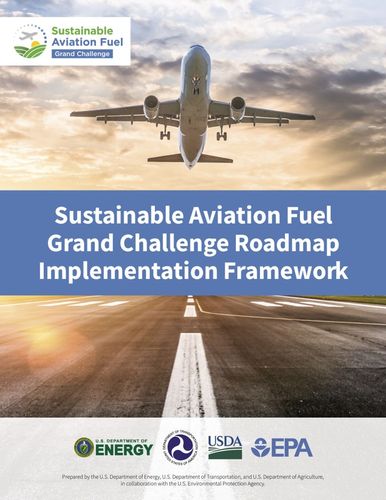Federal agencies announce new SAF implementation framework to reduce US aviation carbon emissions

SOURCE: U.S. Department of Energy
November 21, 2024
BY U.S. Department of Energy
An interagency team led by the U.S. Department of Energy, USDA and U.S. Department of Transportation’s Federal Aviation Administration today released the Sustainable Aviation Fuel (SAF) Grand Challenge Roadmap Implementation Framework. The Implementation Framework highlights current Federal agency capabilities and programs aligned with the actions called out in the SAF Grand Challenge Roadmap and identifies existing gaps where additional effort, public-private partnerships, and support will be needed to meet the goals set forth in the SAF Grand Challenge.
"Advancing sustainable fuel technologies is essential to building a thriving bioeconomy that benefits all Americans while also cutting harmful emissions and delivering healthier communities,” said Jeff Marootian, principal deputy assistant secretary for DOE’s Office of Energy Efficiency and Renewable Energy. “This framework highlights the incredible opportunity to unlock exciting new economic opportunities for agricultural and rural communities across the nation and build upon the groundwork laid by the Biden-Harris administration to support a growing sustainable aviation fuel industry.”
“Sustainable aviation fuel use expands economic opportunities for American farmers, business owners and rural communities,” said Chavonda Jacobs-Young, under secretary for research, education and economics and the USDA’s chief scientist. “This effort highlights the power of scientific innovation to drive us toward our national goals and the potent momentum of government organizations working together to accelerate progress towards a sustainable future for aviation fuels.”
Advertisement
Since the establishment of the SAF Grand Challenge in 2021, which set an ambitious goal to produce 3 billion gallons of SAF by 2030, and 35 billion gallons of SAF by 2050 to meet 100% of domestic jet fuel demand, annual SAF production has dramatically increased—highlighting the growing momentum for this important initiative to reduce carbon emissions from the aviation sector. By mid-2024, 13 million gallons of SAF were domestically produced. Announced domestic projects represent potential for over 3 billion gallons of annual SAF production capacity—representing $44 billion of announced investment—by 2030.
The Commercial Aviation Alternative Fuels Initiative estimates that about 2 billion gallons of SAF are currently expected to come online by 2028; additional volume can be expected if barriers are addressed as described in the Implementation Framework, such as market demand, policy framework, and airline offtake agreements.
The Implementation Framework is a directional guide for the SAF Grand Challenge Roadmap and demonstrates coordination and planning for the multiple agencies involved with different missions and approaches. Organized by six roadmap action areas, the Implementation Framework covers feedstock innovation, conversion technology innovation, building supply chains, policy and valuation analysis, enabling end use, and communicating progress and building support. The SAF Grand Challenge interagency team is committed to supporting achievement of the SAF Grand Challenge goals as demonstrated through:
- Research and development of sustainable feedstock and fuel production technologies, providing support for technology scale-up and advancing environmental analysis of SAF.
- Support of U.S. farmers with climate-smart agriculture practices and research.
- Loan guarantees to commercial-scale SAF projects that utilize innovative technology to convert feedstock to SAF and avoid, reduce, or sequester greenhouse gas emissions.
- Provision of capabilities and funding to support SAF qualification, U.S. and international standard-setting, and development of infrastructure and transportation systems
The U.S. transportation sector has become the largest source of carbon dioxide (CO2) emissions in the country with aviation generating approximately 11% of U.S. transportation-based CO2 emissions that contribute to climate change. Developing innovative technologies to produce SAF will enable the United States to meet President Biden and Vice President Harris’ climate goals and position it as a global leader in the emerging SAF market.
Advertisement
The Biden-Harris Administration continues to collaborate with a broad range of SAF stakeholders that include airlines, aircraft and engine manufacturers, energy producers, researchers, and international participants to build relationships, share and collect data, identify resources, and direct research, development, and deployment of SAF.
The SAF Grand Challenge, launched in 2021, is a government-wide strategy, led by DOE, the USDA, and DOT. It builds on sectorwide industry commitments to foster innovation and drive change across the entire U.S. aviation emissions and ecosystem. In September 2022, federal agencies published the SAF Grand Challenge Roadmap, outlining a whole-of-government approach with coordinated policies and specific activities that should be undertaken by the government to support achievement of the SAF Grand Challenge goals.
The SAF Grand Challenge supports the U.S. National Blueprint for Transportation Decarbonization aviation goals to reduce all greenhouse emissions from the transportation sector by 2050. The Blueprint, developed by the Departments of Energy, Transportation, Housing and Urban Development, and the Environmental Protection Agency, is a landmark strategy to realize an improved and sustainable transportation future.
Learn about SAF and download the full Sustainable Aviation Fuel Grand Challenge Roadmap Implementation Framework to review current agency capabilities and programs to implement Roadmap actions, as well as gaps and barriers to achieving SAF Grand Challenge goals.
Related Stories
President Trump on July 4 signed the “One Big Beautiful Bill Act.” The legislation extends and updates the 45Z credit and revives a tax credit benefiting small biodiesel producers but repeals several other bioenergy-related tax incentives.
SAF Magazine and the Commercial Aviation Alternative Fuels Initiative announced the preliminary agenda for the North American SAF Conference and Expo, being held Sept. 22-24 at the Minneapolis Convention Center in Minneapolis, Minnesota.
Saipem has been awarded an EPC contract by Enilive for the expansion of the company’s biorefinery in Porto Marghera, near Venice. The project will boost total nameplate capacity and enable the production of SAF.
International Air Transport Association has announced the release of the Sustainable Aviation Fuel (SAF) Matchmaker platform, to facilitate SAF procurement between airlines and SAF producers by matching requests for SAF supply with offers.
Alfanar on June 20 officially opened its new office in London, further reaffirming its continued investment in the U.K. The company is developing Lighthouse Green Fuels, a U.K.-based SAF project that is expected to be complete in 2029.
Upcoming Events










